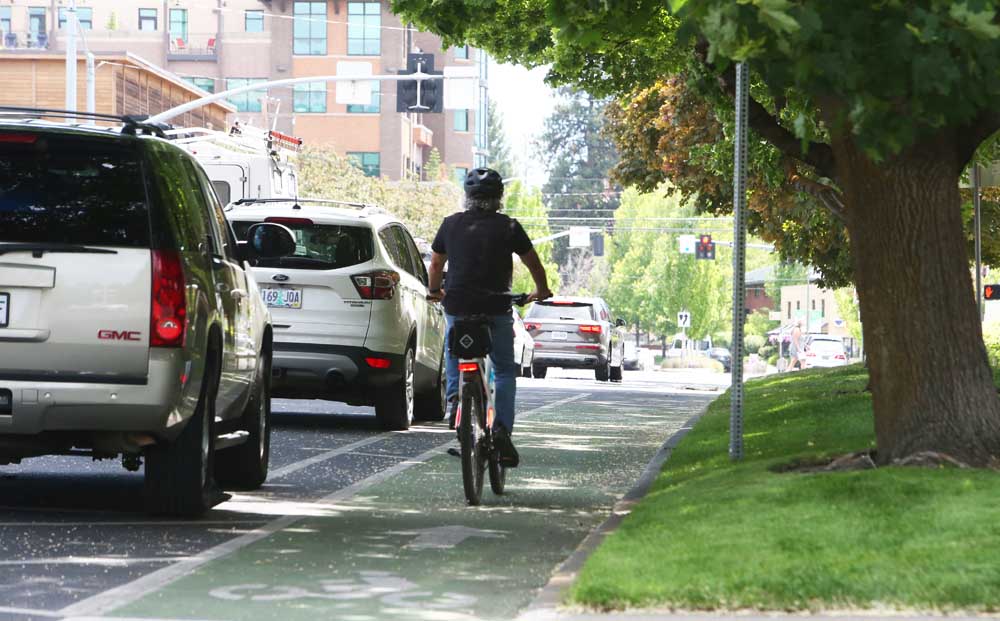You’ll soon be paying more for Bend’s transportation system
Published 5:30 am Friday, September 15, 2023

- A cyclist rides June 13 along NW Franklin Avenue in Bend.
Soon, most Bend residents and businesses will have another cost on their utility bills: a transportation fee.
The city envisions the fee generating an extra $15 million per year to fund transportation projects, which could include street maintenance, bicycle and pedestrian improvements and overall safer roads.
Trending
At the core of the fee is that everyone relies on the transportation system, whether it be mail and food delivery, garbage collectors or commuting. The city, struggling with mounting road projects and funding gaps left behind by property-tax limitations, needed a way to finance its goals.
Thus, the transportation fee was identified as a possible solution to fund part of the gap, but it’s not the entire solution, said Sarah Hutson, a senior policy analyst for the city. Other funding sources such as a seasonal gas tax will be up for discussion in the near future.
“We really think of it as puzzle pieces that fit together,” Hutson said.
But the transportation fee is a certainty.
Some of its details have yet to be determined, but residents could begin paying before the end of 2024.
What would the fee be?
Trending
The fee has evolved significantly since the concept was first made public in March.
Single-family households will likely pay $15 per month while multifamily residences will pay $11 per month per unit, according to early plans. Households that qualify for utility bill assistance will pay less.
What nonresidential establishments will pay is still uncertain, Hutson said.
On average, businesses could pay around $215 per month, but some could pay more and others could pay less, Hutson said.
But different types of businesses have different impacts on Bend’s transportation system, and the city wants to take that into consideration.
Businesses will account for roughly $7 million of the annual revenue from the fee while residences will account for around $8 million.
Businesses that generate a lot of vehicle traffic — gas stations, hotels, motels, grocery stores — have a higher impact on Bend’s transportation system, and could pay a different fee than businesses that don’t have such a high impact.
However, many local business owners who also own homes in Bend would be doubly burdened having to pay both residential and nonresidential fees, City Councilor Anthony Broadman said Wednesday.
“All of the small businesses, or most of them, are going to be residents also, so I think we should keep in mind it’s not either or,” he said at a discussion of the fee Wednesday.
Bend is joining the ranks of other Oregon cities including Coos Bay, Hillsboro, Newberg and Oregon City, all of which have already implemented transportation fees.
Oregon City uses revenue from its fee for road maintenance and improvement. Hillsboro uses revenue from its fee for the same along with bicycle and pedestrian infrastructure improvements.
What would Bend’s fee pay for?
Pedestrian and bicycle improvements have risen to the top of the priority list in Bend, based on community feedback.
Survey suggests Oregonians riding bikes less often due to poor air quality, safety concerns
At a discussion Wednesday among a group of business and public-sector representatives, nonprofits, transportation specialists and elected officials, ensuring safer, more connected biking infrastructure was a common theme.
Wednesday’s meeting was the second of three. The next meeting in October will include conversations about different funding sources that address the impact visitors have on Bend’s transportation system, so the burden doesn’t only fall on locals. Plus, what options will exist for low-income households that could qualify for a reduced fee will be discussed.
Early estimates say around 2,000 utility accounts in the city will qualify for fee assistance, said Dana Wilson, the city’s utility business manager.
Those estimates are based on work the city has already been doing alongside nonprofit NeighborImpact to create two new assistance programs for Bend residents’ utility bills, which will come before City Council for approval Wednesday.
“We know we have to get programs out there for families and families with children,” Wilson said.
Those populations are the ones that most frequently request utility assistance.
The two utility assistance programs will give the city a framework for transportation fee assistance when it goes into effect, Wilson said.
The third and final discussion on the transportation fee is scheduled for Oct. 11. Public comment is not received at the discussions, but people can watch them online on the city’s website.
More information about the transportation fee can be found at bendoregon.gov/transportation-fee.








